
Atlas F1 Editor in Chief
Frank Williams and Ron Dennis, along with Gerhard Berger and Norbert Haug, have met the media this weekend, at Imola, and were faced primarily with similar questions: about the new rules, their arbitration process against the FIA, the GPWC threat, and any other subject that has nothing to do with the racing itself. Biranit Goren was there to ask the questions and get the answers. She brings the words of these men unfiltered, in full. This is what the Business of Formula One sounds like
GPWC Holding B.V. was founded at the end of 2001 by shareholders BMW, DaimlerChrysler, Fiat, Ford and Renault with the aim to start a new Grand Prix World Championship racing series as of 2008. Japanese carmakers Honda and Toyota have also been invited to join the group. Two weeks ago, the heads of all ten teams have met with the board of directors of the GPWC. In a statement released after the meeting, GPWC said all Formula One teams have agreed to work with the company on the new, 2008-opening series. Was this the beginning of the end to Formula One as we know it?
McLaren team chief Ron Dennis was waiting for that question, the inevitable question about his team's agreement with the GPWC.
"There was a hastily written press release coming out of the GPWC meeting at which I was present, and I know it was hastily written because of time pressure," he begins his response, facing a small crowd of reporters on Sunday morning at McLaren's communications centre at Imola. "Therefore, it lacked a bit of clarity as far as I was concerned.
"But to clarify, what it was meant to communicate was that the teams - all of the teams and all of the manufacturers - agreed to some very clear, strategic objectives, which were linked to a detailed presentation to the teams, which in turn was linked to an extremely large document, which is the future as far as the teams are concerned.
If you're trying to figure out what Ron Dennis just said, trust fellow team chief Frank Williams to make it more succinct.
"Everyone seems to me to get a bit tense about the GPWC and the split and this and that," Williams said on Saturday afternoon, shrugging his shoulders at a dozen reporters circling his table. "There are four more years to go in the contract! If I had four more year contract with BMW I'd have my feet up on the table, I'd show up late for work, I'd be relaxed so to speak. I mean, what's the fuss?"
Gerhard Berger, the retiring BMW motorsport director, sitting alongside Williams, smiles. "I am not too convinced myself about this breakaway series," he says. "I just see everyone saying they'll get more money and I don't know where that money is supposed to come from. Everybody thinks it's going to be this great future - the teams are going to get more [money], the drivers are going to get more, the FIA is going to get more, Bernie is going to get more..."
"Oh no," veteran journalist Mike Doodson stops Berger, "the only person who doesn't seem to be getting more from this future is Bernie. He doesn't seem to be getting more out of this either way!"
Williams looks at Doodson and smiles wryly. "You know," he says, very slowly, "I must be very careful what I say... but I think the outcome of the GPWC, whereby to everyone's surprise the ten teams signed an agreement, I think it was just the teams stating a position that unless Bernie has a better offer - because he's not very good at making great offers, Bless Him - for the long term after 2007, then we'd rather go with GPWC.
"But we all realise there's going to be a lot of water running under the bridge before GPWC becomes a real series, and we all also know that one series is better than two series. So there's hardball activity going on."
Q: So how do you see it panning out?
Williams: "There'll be a deal, a new deal, probably in the next 12 months."
"By the way," Berger intervenes, still with Doodson's remark on his mind, "One thing is a fact: in the last 30 years, in every business he was involved in, Bernie never got out with less money than he came in with..."
Some 50 metres down the paddock, and several hours later, Mercedes vice president, Norbert Haug, joins the fray.
"I cannot see two championships [running at the same time]," Haug states, "but I can definitely see a championship that has to do with GPWC at latest in 2008, and I'm quite sure that a solution will be found before. Maybe some stuff to the background - and I do not want to lobby for GPWC - but I think it's very clear, with manufacturers investing in this sport, that they want to be sure to have a long term future and they want to just have a fair base.
Q: Those concerned about manufacturers in F1 are obviously looking at examples like the sportscar world championship and the ITC, where the individual needs of the manufacturers ended up being influential in splitting the championship up in the end. Is there not a chance this might happen in Formula One as well?
Haug: "I can understand this concern, basically. But we should not compare Group C racing to Formula One. In Group C racing we did not have teams - we have very, very strong teams in F1, and the manufacturers are not the ones that like to run the show and make the rules. They certainly can be in the background, like we have in DTM, and it works. I understand your concern. What I do not understand are some political issues, people running through the paddock saying manufacturers are bad.
"I think it is fair to say the manufacturers helped a lot in the last 10 years to bring F1 to a stand where F1 is right now. So I can't see any reason why manufacturers should not be good for F1. They make F1 stable. But the base line in F1 are very, very strong teams. We have a very strong team with McLaren and if you compare that to Group C, you certainly didn't have that there. Also, ITC didn't die because of the manufacturers. It died because Opel and Audi decided to leave ITC. It was their choice. Here, on the other hand, the heart of GPWC is and will be contracts for long term commitment."
Q: You say that dividing revenues is the one of the big issues. Ron Dennis said in Australia that the teams get 23% of the total revenues; football teams, he said, get 75%. Approximately what would you think be a fair figure for F1 teams to get?
Haug: "I think, really, this is not the right place to discuss whether it should be 25, 27, 75... it should be fair. But I am sure we can find a fair solution."
Q: You said the manufacturers don't want to run Formula One. Could you clarify, then, what it is you're trying to get out of the negotiation or what it is that's prompted you to set up GPWC? Is it simply about getting more money?
Haug: "No, not simply more money. The money goes to the teams, which is important - it will help them. But there is the long term base line - we want to know what's going to happen in the next few years."
Q: So how long is long term?
With just weeks to go before the 2003 began, FIA president Max Mosley literally dropped a range of new rules and regulations on the teams - from one-lap qualifying procedures to the banning of electronic driver aids as of Silverstone this year. Since then, some changes have been aborted, others clarified, and some more are still debated between the FIA and the teams.
Hovering above all these discussions, though, is the intent of McLaren and Williams to challenge these new rules in an arbitration process, claiming the rules - and particularly how they were imposed on the teams - are invalid. While the teams continued holding marathon meetings during the weekend with Mosley, and as further changes and revisions to the new formula are promised to be introduced, are McLaren and Williams set to continue the legal battle or are they, as Max Mosley himself told reporters, likely to drop the procedure in favour of a settlement?
"We had a meeting here with Max [Mosley] a couple of days ago," Williams tells the reporters on Saturday afternoon, "and not everything is perfect in my opinion, but the main effect of making the racing better seems to have been achieved. Although I expect the rain also helped."
Williams is careful when he speaks about the team owners' meeting with the FIA president. There have been several meetings over the weekend at Imola, and while all participating made sure to compliment each other on seeming progress, they all remained tight-lipped on the outcome. But if you listen well to Frank Williams and Ron Dennis, you can get a glimpse of where the wind is turning.
Q: Since you all agreed to keep the current rules for the rest of the season, how does that go with the fact that you and Ron Dennis are taking the FIA for arbitration over the new rules?
Williams: "The arbitration takes a long time, and our agreement to keep the rules for the rest of the season doesn't weaken our position in the arbitration - that's an acknowledged legal fact. Our argument wasn't with the rules, it was with the way in which they were introduced."
Interestingly, Dennis himself, when addressing a similar question the morning after, would hold a somewhat different stance with regards to the arbitration. From his standpoint, he is challenging some of the new rules, and not just "the way in which they were introduced," as Williams puts it.
"I think, as Max told the media post the teams principal meeting that took place on Thursday, we did make quite a bit of progress," Dennis says. "We were looking at those things in 2003 that we felt were positively contributing to the spectacle of F1. Clearly we had three very good races, but you have to analyse why.
"There is still in varying degrees a discomfort with the parc ferme procedures, and we did arrive at a position in that respect that we would go away and if we could come up with something we all felt was better then Max will support it and it could be adopted. And, of course, there were several changes made - like the use of the T-car and a range of other details.
"However, there are some longer term issues which relate to 2005-6-7, which have to do with engine use and engine stability rules, and those too were positively discussed. But, as always, with these regulatory processes the devil is in the details, and it's extremely important that if we do adopt formally and through following the right processes some of the rules that have been imposed on us, then it's got to be on the basis of embracing all of the problems that we have with some of the suggestions - multi-weekend engines, etc.
In a nutshell: Dennis believes they could reach a settlement.
Williams doesn't necessarily disagree, but he seems less enthused to drop the arbitration idea. "Not at all, no chance," he exclaims firmly when asked if indeed he is considering dropping the arbitration process, now that Mosley and his fellow team owners are on speaking terms again. He even shrugs off suggestions that Dennis, his co-conspirator, is considering bailing out.
"Well there's no chance," he reiterates. "We're not at war, we just want to be sure that unilateral rule changes doesn't happen again, unless it's within the rules. The Concorde agreement is a contract, and it's a contract which provides us with some good racing, not a lot of the share of the revenue - but we don't whinge about it. We're grown up men, we signed it and we all know it and we will abide to it until 2007."
Q: So do you think a solution could be reached with Max so that arbitration is not needed, that you'd agree to?
Williams: "It's possible, absolutely possible, yes, sure. And any conversation that I had with Max and with Ron had been extraordinary. Well, that's an exaggeration - very affable. There's no acrimony."
It's also instrumental to note what these two extremely sharp team owners think about some of the imposed - and proposed - changes. Take the controversial Parc Ferme rule, whereby teams can no longer tweak, tune and work on their cars to their heart's desire between Saturday's qualifying and the race. One of the arguments against the rule to begin with had been that it would increase mechanical failures in the race, which could subsequently prove to be unsafe.
In reality, though, there have been less retirements in the first three races of this season than before, something that doesn't surprise Frank Williams at all.
"Well in two races it rained so there's far less mechanical stress on the cars," he says. "It also doesn't surprise me, because in general Grand Prix cars have become more and more reliable. But the fact is that as far as we are concerned - and one of the main reasons we are going to this arbitration - is we just feel that if we need ten hours to make a Grand Prix car finish a race, then we should have ten hours. Now we have to do it in two and a half hours, and it means you just must, de facto, cut some corners sometimes."
Q: Is there a way to ensure the teams don't build a qualifying car without the Parc Ferme rule?
Williams: "Absolutely. The teams agreed on the 6th of December [2002] - before these changes [were introduced] - on a list of items. That's the teams and technical directors at the same time, and they [the technical directors] are the true experts, they are able to control it, because the best scrutineers in the paddock are the engineers. They spot changes, they spot the rear wing going up on Michael's car, it's never missed, that sort of thing. You know, we all know each other's changes, which tyres are off, how many laps they did... fantastic scrutineers."
Q: So Max was not convinced by this offer?
Williams: "We were sloppy in getting a formal list to Max before the 15th [of December, 2002]. It took too long."
Q: Was this proposal not suggested in the teams' meeting this weekend?
Williams: "Sure, yes. The teams will deal with that, but I can't divulge what was agreed. A number of useful things were agreed - also along the lines of what you are referring to. But I don't think it's proper of me to spout, as it's not signed up yet."
Q: What about the single wet tyre situation?
Williams: "That hasn't been resolved yet. But Max should make a decision, make sure cars are safe to race."
Berger intervenes, that famous sly smile on his face. "I tell you something," he says, leaning forward as if to share a secret. "I love it! I was watching the last race on TV and seeing the cars on the grid with those [intermediate] tyres I thought, oh shit - there's gonna be trouble!"
Back at the McLaren motorhome, Dennis is also facing questions about some of the new rules. In Brazil, Dennis's team were allowed to change Kimi Raikkonen's engine before the race, as were BAR for Jacques Villeneuve. It seemed yet another loophole was found in the new rules, and Dennis readily admits this is an inevitable outcome of change.
"There's lots of things that have not been properly thought through," he says, "and when you start playing with regulations you very often find a far bigger domino effect than you anticipated."
In the case of Raikkonen's engine change, this will no longer be allowed as the teams and Mosley agreed that from here on, a change of engine between qualifying and the race would require the driver to start at the back of the grid. Surprisingly, Dennis supports this new clarification.
"It sounds very severe on face value," he says, "but when you analyse it - you've only done two slow laps and one fast lap, so in total the engine's only done two jogs and one sprint, and it really should be able to tolerate that [stress]. And if the best way to have absolute clarity - black and white rules - is to adopt that process, then we can I think accept it. What is difficult to accept is that it's in fact a regulatory change. And it's the process - or the lack of process - in achieving a regulatory change that we feel uncomfortable about, not the outcome."
Dennis is also forthright about his support of maintaining electronic driver aids. In fact, some would say the promise of a ban on traction control was the rule change he was most willing to fight over to the bitter end. And, with the FIA now stating that driver aids will not be banned this year, and a possible ban for 2004 onward will be reconsidered, Dennis seems pleased.
"There is an understandable desire by the purists, of which I am one, to see the maximum opportunity given to a driver to demonstrate his skill," he says. "But there is a misconception because of lack of knowledge of what actually electronics do and what role they play in 'de-skilling' a driver. Brazil is a classic example of the lack of contribution that these systems have: the drivers were still making errors, and you see drivers making errors yesterday in qualifying, including our own drivers.
"Taking [electronic aids] away from the car is going to trigger certain things that we feel are really bad for Formula One. The first thing is we genuinely believe you cannot police it. That is why it was reintroduced back. The second thing, of far greater concern to the teams, is that some of the parameters of control - the 3D control mechanism of the throttle - these allow the electronics to eliminate the bad qualities of an engine. Torque, power, elements of the engine. If you take the electronics away, the engine manufacturers will incur tens and tens, huge sums of money trying to duplicate mechanically what is inexpensively achieved electronically. So there are massive cost consequences.
"Putting aside all the cheating issues - though we don't want to go back to appeals and allegations that other people are cheating - this is the best solution for future stability."
The Long Term Power Game: the GPWC
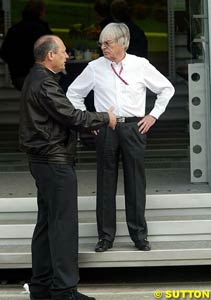 "That organisational agreement has taken months to prepare, has involved the teams and all the teams' legal representatives. It probably runs around 200 pages, a very complex and detailed document that we think represents the future. There is - and that was the message that we gave - there is a clear wish for Bernie [Ecclestone] and the FIA to be involved in that process, but we do want to take control of some elements of our destiny and change costs money, so we'd like the people making the changes to be the people whose money it is. That is one of the strategic objectives, and all sorts of other issues - transparency, etc."
"That organisational agreement has taken months to prepare, has involved the teams and all the teams' legal representatives. It probably runs around 200 pages, a very complex and detailed document that we think represents the future. There is - and that was the message that we gave - there is a clear wish for Bernie [Ecclestone] and the FIA to be involved in that process, but we do want to take control of some elements of our destiny and change costs money, so we'd like the people making the changes to be the people whose money it is. That is one of the strategic objectives, and all sorts of other issues - transparency, etc."
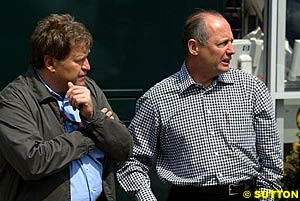 "I think the manufacturers are very much the future of this sport. I do not share the opinion that you do not need manufacturers in Formula One - I think you need them, I think you need their long term investment. I think it's good for you guys to have world class manufacturers competing against each other, so for me it is important. For sure this is a drivers' championship but as long as the biggest manufacturers are involved - as long as you have the Renaults, the BMWs, the Mercedes, and so on - I think you can rely that there is a sound basis for a championship. We do not want to fight but we want to have a long term future and I think that's just fair enough."
"I think the manufacturers are very much the future of this sport. I do not share the opinion that you do not need manufacturers in Formula One - I think you need them, I think you need their long term investment. I think it's good for you guys to have world class manufacturers competing against each other, so for me it is important. For sure this is a drivers' championship but as long as the biggest manufacturers are involved - as long as you have the Renaults, the BMWs, the Mercedes, and so on - I think you can rely that there is a sound basis for a championship. We do not want to fight but we want to have a long term future and I think that's just fair enough."
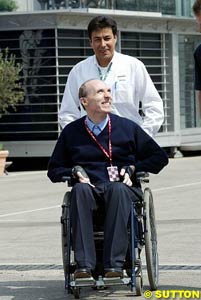 Haug: "For us there's currently no limit. I think it is very important that F1 stays like it is right now. It's perfect. It's interesting, it's a great platform. I cannot tell you that we are committed for 5, 7, 12 years. We will remain committed as long as it stays interesting like it is right now, as long as it's a perfect platform. And I think it is these days."
Haug: "For us there's currently no limit. I think it is very important that F1 stays like it is right now. It's perfect. It's interesting, it's a great platform. I cannot tell you that we are committed for 5, 7, 12 years. We will remain committed as long as it stays interesting like it is right now, as long as it's a perfect platform. And I think it is these days."
The Short Term Battle: the Arbitration
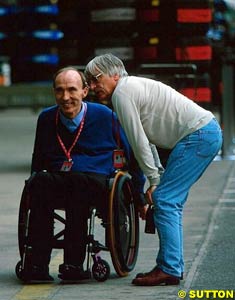 "All of these problems have to be resolved, and if we come to a satisfactory conclusion then clearly it will not be in the interest of the sport to follow through on the arbitrary process. But it is a long, worn-out process anyway and I'm optimistic that we can come to a satisfactory conclusion for all of the teams."
"All of these problems have to be resolved, and if we come to a satisfactory conclusion then clearly it will not be in the interest of the sport to follow through on the arbitrary process. But it is a long, worn-out process anyway and I'm optimistic that we can come to a satisfactory conclusion for all of the teams."
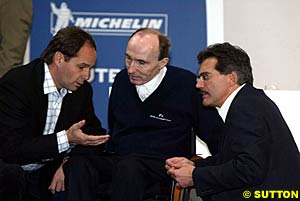 Williams chuckles, but he also agrees the spectacle wasn't necessarily damaged. "The best example to me is 1995, at the Nurburgring, [Jean] Alesi versus Michael [Schumacher], fantastic race! And they held very long on intermediates, didn't they?"
Williams chuckles, but he also agrees the spectacle wasn't necessarily damaged. "The best example to me is 1995, at the Nurburgring, [Jean] Alesi versus Michael [Schumacher], fantastic race! And they held very long on intermediates, didn't they?"
Please Contact Us for permission to republish this or any other material from Atlas F1.
|
Volume 9, Issue 17
Atlas F1 Exclusive
Stirred But Not Shaken
The Arbitrationists
Interview with Jean Alesi
San Marino GP Review
2003 San Marino GP Review
Requiem for a Lightweight
Ann Bradshaw: View from the Paddock
A Question of Timing
Stats Center
The Race in Action: San Marino
Qualifying Differentials
SuperStats
Charts Center
Columns
Season Strokes
Elsewhere in Racing
The Weekly Grapevine
> Homepage |